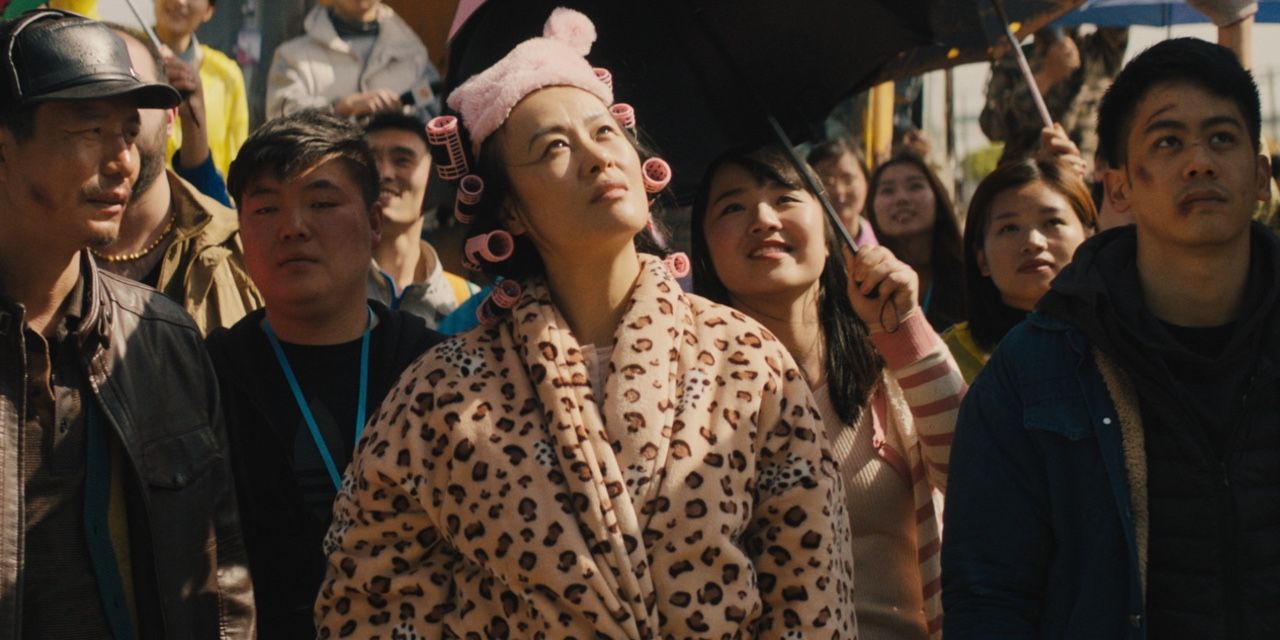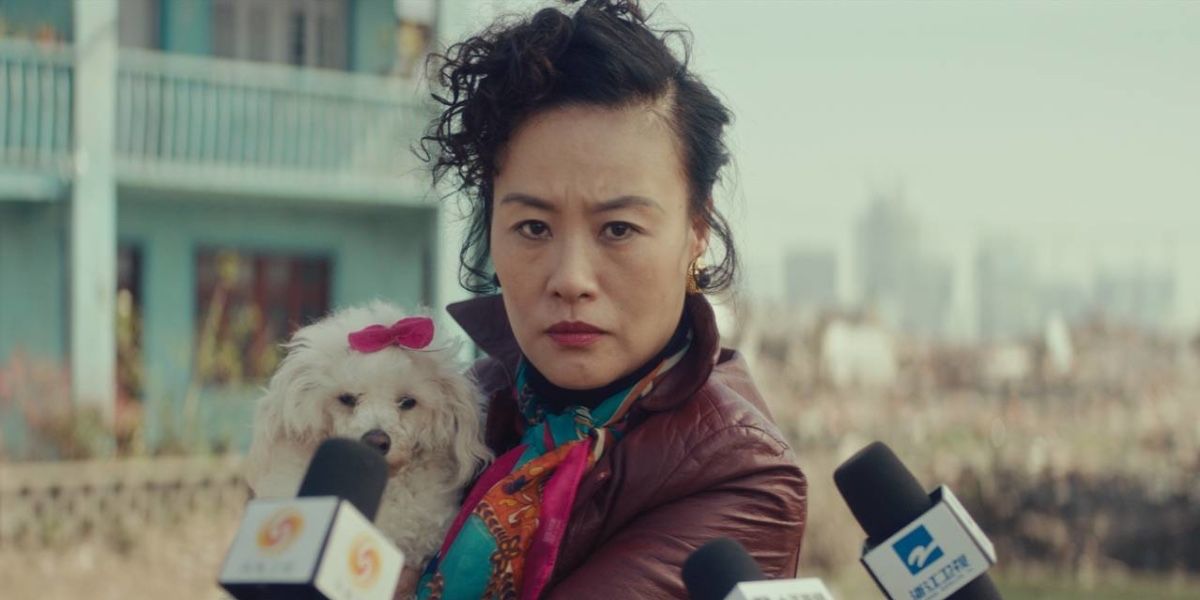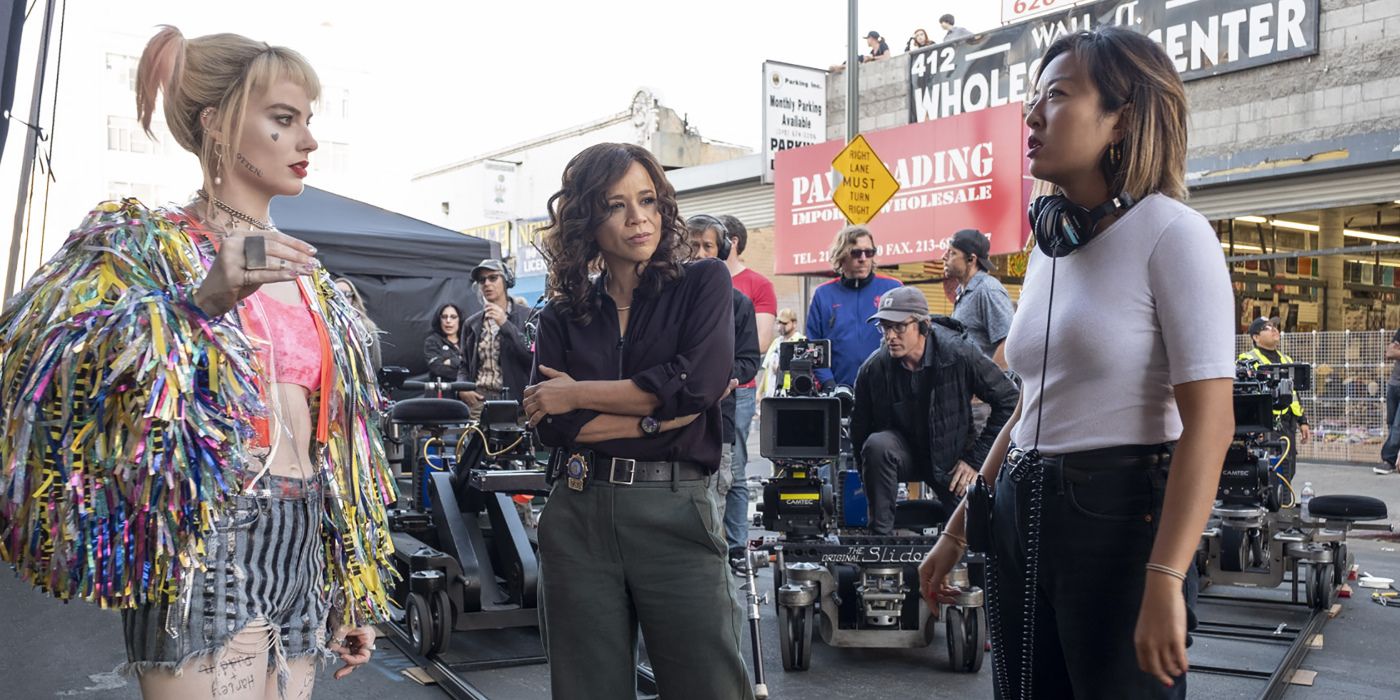Cathy Yan may have made a splash with Birds of Prey, but her feature film debut was actually an independent Chinese film called Dead Pigs. The Sundance Award-winning film originally premiered in 2018, but is finally seeing a wider release through the MUBI streaming platform on February 12.
Yan spoke to Screen Rant about bridging the generational and cultural divide between families in China in her story, and about what lessons she took away from her breakout film.
I know that you were a journalist with Wall Street Journal, which seems like a perfect starting point for a movie. But what inspired the other characters?
Cathy Yan: Yeah, it started with Wang; I think it started with the pig farmer, because it really made me start to think about getting past that headline of, "How did this happen?"
It wasn't this big conspiracy theory of corporate scandal, it was more a collection of these small pig farmers desperate enough that they have to throw their livelihoods down the drain, essentially. That made me really think about the character, and where they came from, and why this would have happened at all. To not judge them, like, "Why are you so stupid to do that?" But more like, what's the context and what was the pressure on them to do such a thing? And so I started there.
Then Candy sort of came about because she was very much inspired by [nail houses]. When I was in university, I wrote a thesis about this phenomenon of nail houses in China - nail houses being the type of house that she's in - where they refuse to leave, and then they start excavating the land around them. There was a very famous example of that in Chongqing, with a couple. The wife was actually quite vivacious and became a little bit of a media darling. A lot of Candy was inspired by her.
Sean was inspired by my own time in China when I went back to report and was an expat. I befriended a lot of people like Sean, who had no relationship relation to China, but felt for some reason or another they wanted to go there and tap into those opportunities. I've always found that to be really interesting, because there's so much you give up in order to make a new life. I think we're very programmed to think that immigrants only work on one side; everyone wants to come to America. But how about the Americans that go to China to pursue their dreams? That's kind of where that came from.
And everyone else kind of fell into those categories.
I saw a documentary on Vice about the fascination with Western culture that they seem to have. Is that what inspired the Angie and Sean relationship?
Cathy Yan: Yeah, it's a real thing there. I think maybe less so now - China moves so quickly, so I think there's probably a little more pride and patriotism and nationalism now than there was. But I think the fascination with the West meant that there was a sense of superiority there, and it was valuable to have a white face, and that's kind of it.
But I was interested in what does that do to someone, in a way where you're not really a model, but you get hired and see your value purely based off the way you look. To be tokenized like that; it's not racist, and it's almost like admiring the person. But at the same time, you can't help but feel odd about it, and a little bit tokenized. I certainly know what that feels like in the reverse, so I think that's what I was exploring with Sean.
This seems like a pretty accurate representation and a celebration of the people of China. And it passed China’s censorship, which is no easy task. Can you talk about that process? Because even behind the camera, you had a bunch of people from different parts of the world.
Cathy Yan: Absolutely. That was definitely intentional, because I knew that this movie wasn't just going to be your typical arthouse Chinese indie. Not to say there's many of those either. But I think I bring a bit more of that American indie sensibility, and my DP Federico Cesca was a dear friend from NYU that we brought over. My producers were all Chinese, but they spoke English very well and were quite westernized. We tried to just find like-minded people that were, as you said, bi-cultural or understood it. My costume designer, Athena Wang, had never designed anything for film or television before. She's a fashion stylist, but we just got along so well, and she had a similar background to me. I just knew she would understand the work.
There was a lot of that. We were just taking bets on people that felt some sort of kinship to the material, and that applied to both crew and cast as well. It was a very, very international cast at the same time.
We also get a taste of the different generations represented in the rapidly growing structure of China. How does the change in China affect the characters in this, especially Candy and Old Wang?
Cathy Yan: A lot. I think that it pulls people apart in different ways. Wang and his relationship to his son is just such a insurmountable change in their lifetimes. What they're reading and what they're experiencing in their daily life is just so deeply different. But then you also see the difference between brother and sister as well; he got left behind, and she's a little bit more modernized, but she's steeply nostalgic so she wants to hold on to the past.
I think we're all struggling with that: when to move forward, when to be nostalgic. And you're always giving up something right; change just means that you're constantly changing. That's oftentimes a good thing, but it also means that some people will get left behind. I think that is a conversation that we're having, not only about China but around the world, and certainly in the US. We're realizing how much change has affected people, especially a class of people that have probably felt very abandoned for a long time.
You also wrote the film. Can about what scene you knew was going to be the most challenging in production?
Cathy Yan: Probably that whole rooftop sequence, I would say. I knew pretty early on that I wanted it to rain as well, so that added another element to it. We got lucky, actually, that the weather kind of worked in our favor, but there was still some special effects rain that we had to do.
Just coordinating all of that; coordinating her on the roof, which was all real. She's on the roof, with the tractor the all the different extras. And then of course, I knew it would be a challenge to get that tonal shift right to be able to pull off the ending. I knew that some people would never really like it or understand it, and that was okay, too.
Definitely that whole bit, from just the production of it to how to best execute it so that it would fit within the world of the movie, was the biggest challenge.
When you had her on the roof and him on the ground, did you shoot each coverage separately? Because it feels like they're really playing off the emotions of the scene.
Cathy Yan: We had two cameras, yeah. We shot them at the same time, for that very reason. I didn't want them to have to fake that; it really becomes a conversation that they have with each other, even though it's public and everyone's around. We actually got two cameras to be able to do that.
One of the big themes in this story is family. Can you talk about the father-son relationship in Dead Pigs?
Cathy Yan: Yeah. Like I said, I think there's such a huge generational divide between the two. You don't only see it in China, but with everything changing so quickly, oftentimes - and I certainly feel it even with my parents, because I'm more American than them - you have this cultural divide. I think a lot of immigrant kids feel that.
Certainly in China, so much has changed between the 50s and the 60s and now. I think it's just hard for them to be honest with each other, or to communicate properly or know how to communicate, and what to say and how to support each other. Neither of them are probably the easiest people to deal with, so I think that that's what I was trying to explore. How do you maintain a loving relationship with someone that, frankly, you just don't have a lot of similarities to anymore?
What did you learn on this film that you were able to translate to Birds of Prey?
Cathy Yan: I guess a lot of it. Obviously, I took the experience of having made a feature film into my next one. And I think for me, personally, it was more that I need to stick to my guns and be confident that somehow this wild, crazy thing that I did, in which I trusted my instincts, had worked out enough to get me here. So, stop second-guessing myself all the time; I can do this.
But also obviously the craft. The experience of actually making a whole feature film and working with everyone was obviously incredibly helpful on Birds of Prey. But I think psychologically, it was more like I should really learn to trust my own instincts.
I know that you started off wanting to be a producer. How did you shift into wanting to be a director?
Cathy Yan: I went to film school at NYU, but I did this dual degree program where I got an MBA as well. The program was more set up to be a good creative producer, so that you understood the creative side, but you also understood the business side of things. And I think it felt like a safer route, frankly. There were female producers out there; there were people that I could look to, in which I can envision myself in that in that role.
I grew up watching Fox Searchlight movies and Focus Features movies, and that era of really good independent cinema. I think there was a part of me that always wanted to be a part of that in some way, maybe in acquisitions or distribution, or in development. But the great thing about that program was I still got to have a full MFA education, which included writing and directing short films. And I think quickly, soon after that, I was like, "Well, this is way more fun. I want to do this."
You've directed an indie in China, a few shorts, and Birds of Prey. Can you tell me what kind of stories might inspire you for your next project?
Cathy Yan: Yeah, absolutely. I still feel like I'm very much a journalist at heart, and there's so much in the world right now that is just fascinating. We are all undergoing so much change - I mean, look at this year - and I'm inspired by what's happening right now. It doesn't mean that it has to be a documentary; it doesn't even mean that the story has to be set in the present. But I feel this responsibility to have a reflection and allow the work to inspire more conversations and more thinking around the bigger issues at hand, whatever that may be.
I'm also always driven and fascinated by complicated characters, especially women and people of color; people who've often been relegated to the more cliche and superficial versions of themselves. And a lot of that, I think, is about being flawed and allowing these types of people to make mistakes and to not be so perfect. I think being an antihero is the most compelling character, but only white men get to be antiheroes. That, for me, is a big one: trying to change the game there and really focus on fascinating characters.
I'm always asking myself, "What is this say about the world? Why is this relevant right now, and how can I subvert it? How can I do something that hasn't really been done before?"



